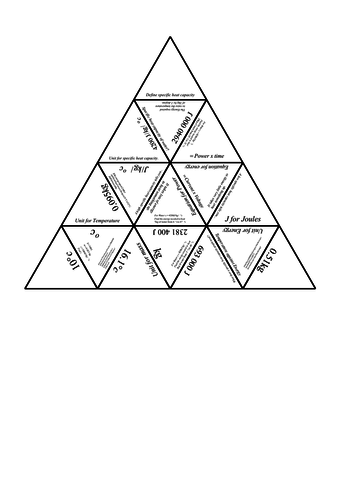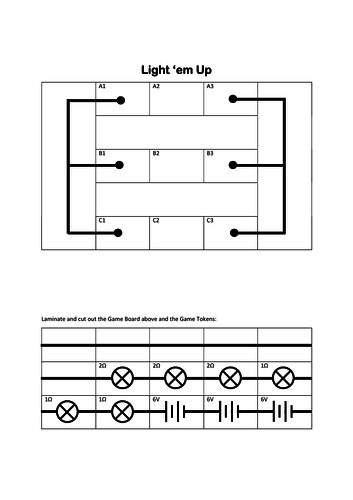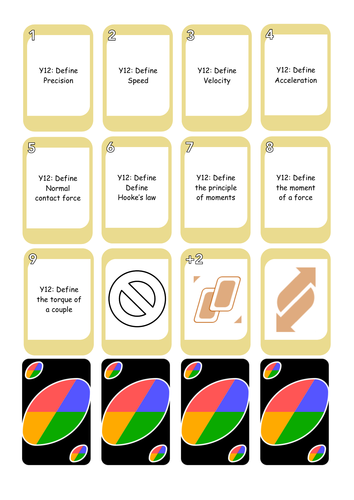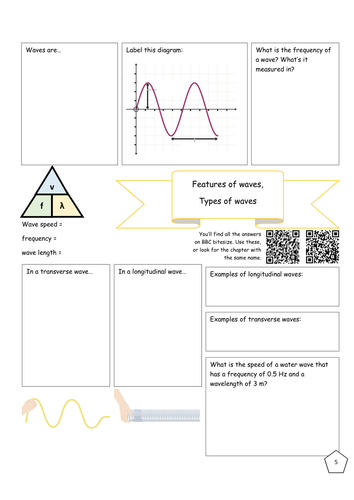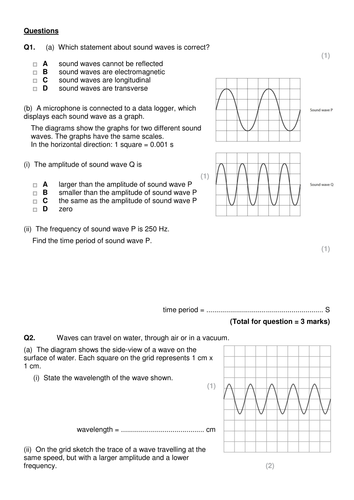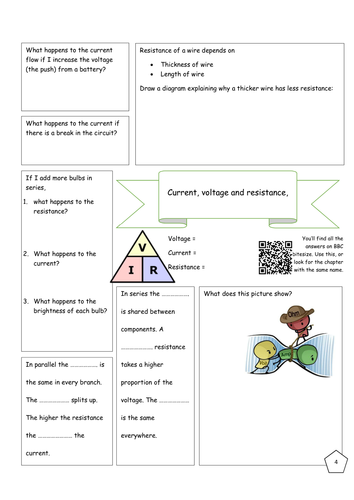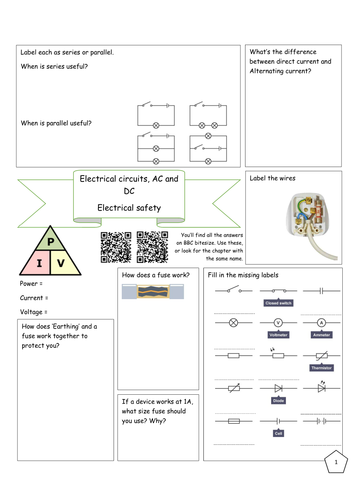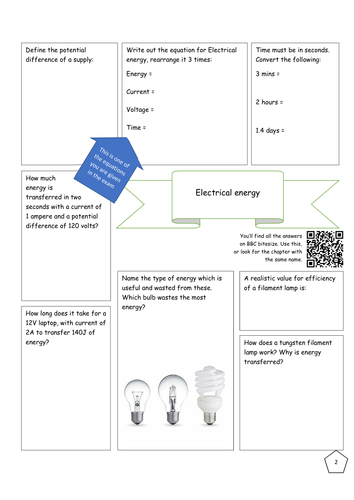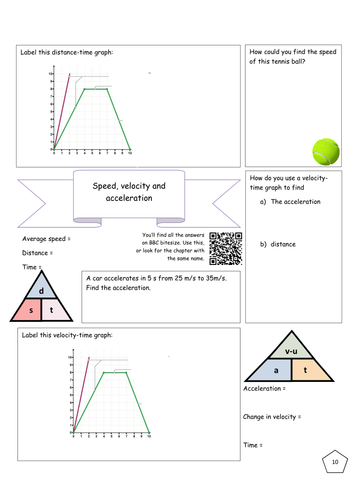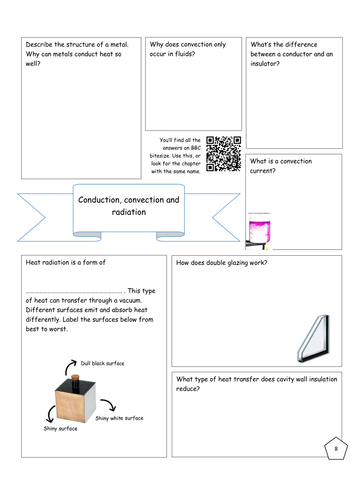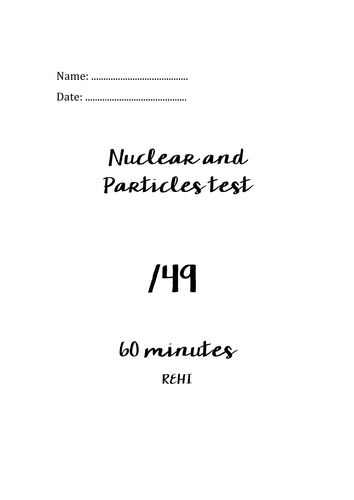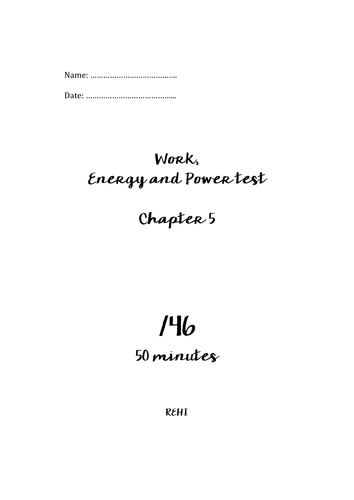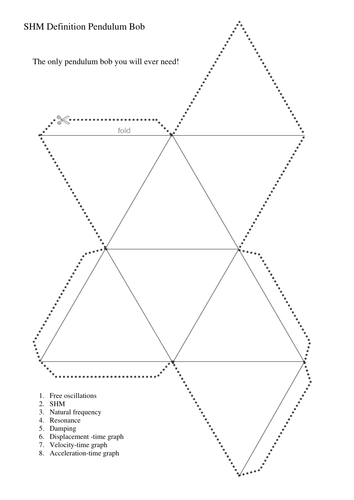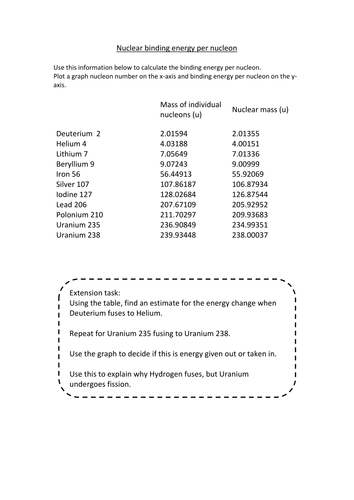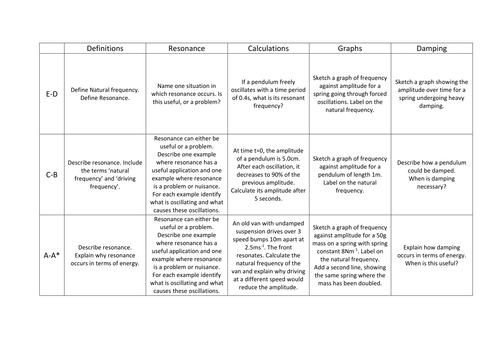
87Uploads
60k+Views
11k+Downloads
Physics

Specific heat capacity puzzle
A Tarsia puzzle on Specific heat capacity. Includes units, and equation questions to test concept and maths.
Works well as a class competition, or would make a nice display.
Pupils cut out puzzle pieces to complete one each I’ve included a solution as well.

Light 'Em Up - The circuits board game
A game based on Battle ships. (Alternative name: Bulbs and Batt(ery) ships?)
“Ammeter on A3”
“Voltmeter from B1 to B3”
I used this as an entire lesson’s activity, pitting my students against each other in a knock out tournament. The game reinforces and assesses their knowledge of voltage and current in series and parallel. It can be adapted to differentiate by giving them suggested boards and including some numbers. I’ve included a cheat sheet page for this purpose.
How to set up:
Design your board.
Work out the voltage and current at different points on your board.
How to play:
The aim of the game is to correctly draw your opponent’s circuit. On your go, choose a square and ask for the current, or choose 2 squares and ask for the voltage across them. Your opponent has to be honest and correct! You can ask 1 question per go and take it in turns until someone can correctly draw the circuit.
Teacher instructions:
Pupils should be in pairs or 4s to play this game.
Each group will need 2 game boards, 2 sets of tokens and 2 answer sheets.
I suggest printing and laminating the game board page and cutting out the tokens, and then printing disposable answer sheets for them to draw and scribble on. You could even use Velcro on the back of the tokens so that they stick to the board.

Investigating speed of a toy car - analysing experiments and drawing graphs homework sheet
This worksheet is designed for use in a lesson or as a homework, to teach about analysing experiments and using data.
The worksheet describes an experiment to find the speed of a toy car. Pupils have to state the independent, dependent and control variables. They have to identify outliers/anomalies , calculate averages, plot a graph of results, and write a conclusion.
Includes an extension to the task - evaluation of the method.
I like to use this as a homework after conducting a similar experiment in class.
Answer sheet is also included.

phUNO - the A-level Physics definition card game
Basically the same as the card game with a similar name, but this time, to play a card, you must correctly define the term on the card.
Forces students to learn their definitions. Works well as a revision activity game, or as a Christmas or Summer activity!
Just print, laminate and cut.
Includes Answer sheet.
The cards are also split into Year 12 and Year 13 definitions based on the AQA Physics spec, but these could easily be ignored.
I've also included an editable version.

Bitesize Waves revision - Features of waves, types of waves
This is a worksheet in a series made to summarise and recap topics from GCSE Physics.
All worksheets are based on BBC bitesize pages with the same name, with a QR code to guide students to the correct page. All the answers to the front page can be found there.
There is then a 15 mark exam-style question to test their new knowledge. Every worksheet in the series is out of 15 so students can track their progress. I've used them with year 11, and set them as homework, that way they are forced to revise early!
This is designed to help revise for the Edexcel iGCSE in Physics, but is fairly universal and should fit with any exam board.
Includes PDFs for easy printing, and word documents for editing.

Bitesize Waves revision - Sound
This is a worksheet in a series made to summarise and recap topics from GCSE Physics. This one has two versions for dual award and separate scientists.
All worksheets are based on BBC bitesize pages with the same name, with a QR code to guide students to the correct page. All the answers to the front page can be found there.
There is then a 15 mark exam-style question to test their new knowledge. Every worksheet in the series is out of 15 so students can track their progress. I've used them with year 11, and set them as homework, that way they are forced to revise early!
This is designed to help revise for the Edexcel iGCSE in Physics, but is fairly universal and should fit with any exam board.
Includes PDFs for easy printing, and word documents for editing.

Bitesize Electricity revision - Static electricity
This is a worksheet in a series made to summarise and recap topics from GCSE Physics. This one has two versions for dual award and separate scientists.
All worksheets are based on BBC bitesize pages with the same name, with a QR code to guide students to the correct page. All the answers to the front page can be found there.
There is then a 15 mark exam-style question to test their new knowledge. Every worksheet in the series is out of 15 so students can track their progress. I've used them with year 11, and set them as homework, that way they are forced to revise early!
This is designed to help revise for the Edexcel iGCSE in Physics, but is fairly universal and should fit with any exam board.
Includes PDFs for easy printing, and word documents for editing.

Bitesize Electricity revision - Electrical circuits AC and DC, Electrical safety
This is the first in a series of worksheets made to summarise and recap topics from GCSE Physics.
All worksheets are based on BBC bitesize pages with the same name, with a QR code to guide students to the correct page. All the answers to the front page can be found there.
There is then a 15 mark exam-style question to test their new knowledge. Every worksheet in the series is out of 15 so students can track their progress. I've used them with year 11, and set them as homework, that way they are forced to revise early!
This is designed to help revise for the Edexcel iGCSE in Physics, but is fairly universal and should fit with any exam board.
Includes PDFs for easy printing, and word documents for editing.

Bitesize Electricity revision - Electrical Energy
This is a worksheet from a series made to summarise and recap topics from GCSE Physics.
All worksheets are based on BBC bitesize pages with the same name, with a QR code to guide students to the correct page. All the answers to the front page can be found there.
There is then a 15 mark exam-style question to test their new knowledge. Every worksheet in the series is out of 15 so students can track their progress. I've used them with year 11, and set them as homework, that way they are forced to revise early!
This is designed to help revise for the Edexcel iGCSE in Physics, but is fairly universal and should fit with any exam board.
Includes PDFs for easy printing, and word documents for editing.

Bitesize Forces/motion revision - Speed, velocity, acceleration
This is a worksheet in a series made to summarise and recap topics from GCSE Physics.
All worksheets are based on BBC bitesize pages with the same name, with a QR code to guide students to the correct page. All the answers to the front page can be found there.
There is then a 15 mark exam-style question to test their new knowledge. Every worksheet in the series is out of 15 so students can track their progress. I've used them with year 11, and set them as homework, that way they are forced to revise early!
This is designed to help revise for the Edexcel iGCSE in Physics, but is fairly universal and should fit with any exam board.
Includes PDFs for easy printing, and word documents for editing.

Bitesize Energy revision - Conduction, convection and radiation
This is a worksheet in a series made to summarise and recap topics from GCSE Physics.
All worksheets are based on BBC bitesize pages with the same name, with a QR code to guide students to the correct page. All the answers to the front page can be found there.
There is then a 15 mark exam-style question to test their new knowledge. Every worksheet in the series is out of 15 so students can track their progress. I've used them with year 11, and set them as homework, that way they are forced to revise early!
This is designed to help revise for the Edexcel iGCSE in Physics, but is fairly universal and should fit with any exam board.
Includes PDFs for easy printing, and word documents for editing.

Nuclear and Particle Physics test OCR KS5 A level
This is a 60 minute assessment made up of past paper questions from the OCR Physics A - H158, H558 course.

Work, Energy and Power test, OCR KS5 A level Physics
This is a 60 minute assessment made up of past paper questions from the OCR Physics A - H158, H558 course.

Simple Harmonic Motion SHM definitions pendulum bob
Student cut out and create a pendulum bob on cardboard, then fill in the definitions to help them remember everything they need to know about pendulums!

Binding energy per nucleon graph task
Students calculate the binding energy per nucleon, then plot this on a graph to give them a binding energy per nucleon vs nucleon number graph.
This activity allows students to practice using the binding energy conversion between 1u and MeV, or E=mc^2. It also allows them to find the shape of the graph themselves.
It comes with an answer sheet.

Radioactivity word loop game questions
Give each student a card. Each card has an answer at a the top, and a question at the bottom. One student reads out their question, and whoever has the answer reads out the answer and the next question. Keep going until you get back to the first student.
This is a great plenary, or starter for the next lesson.
Alternatively, Give the whole pack to one student, and see if they can match them all up to make a big circle.
This one is for the GCSE Physics radioactivity topic.

Power energy time equation question cards
Differentiated Quiz cards on the Power, energy time equation.
E=Pt.
Lots of practise questions.
These come in two levels, foundation or higher. Higher includes conversions between units.

Resonance and damping worksheet
Differentiated worksheet on damping and resonance in pendulums.
Questions are presented in a grid, with difficulty in columns and topics in rows.
Students have to choose one question from each column, but can choose their own level of difficulty.


